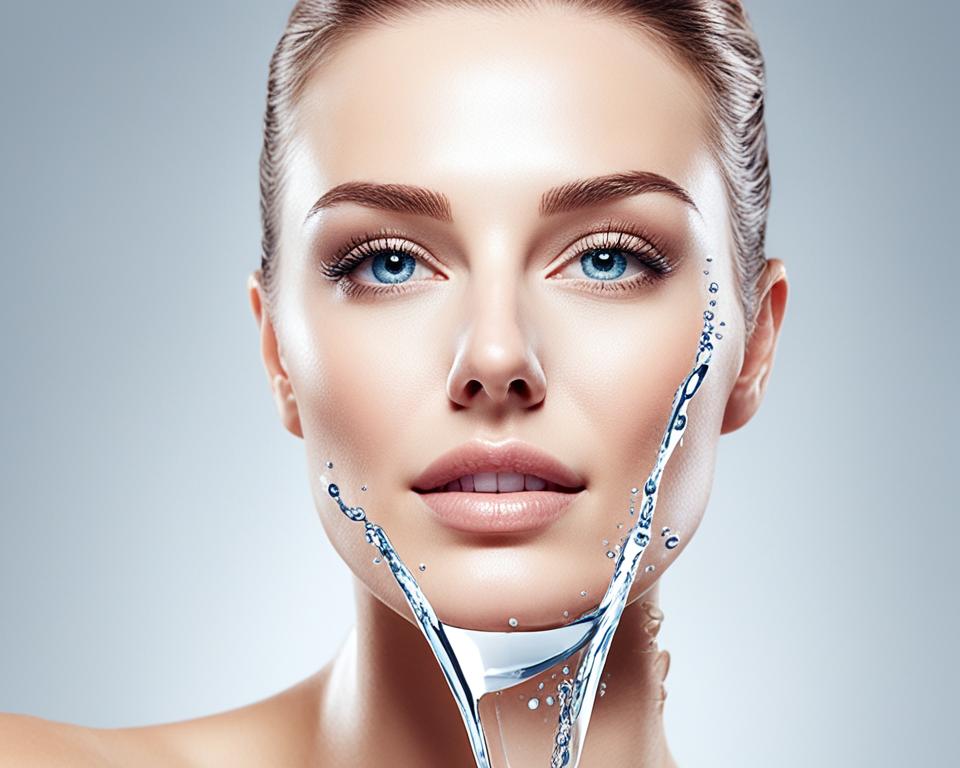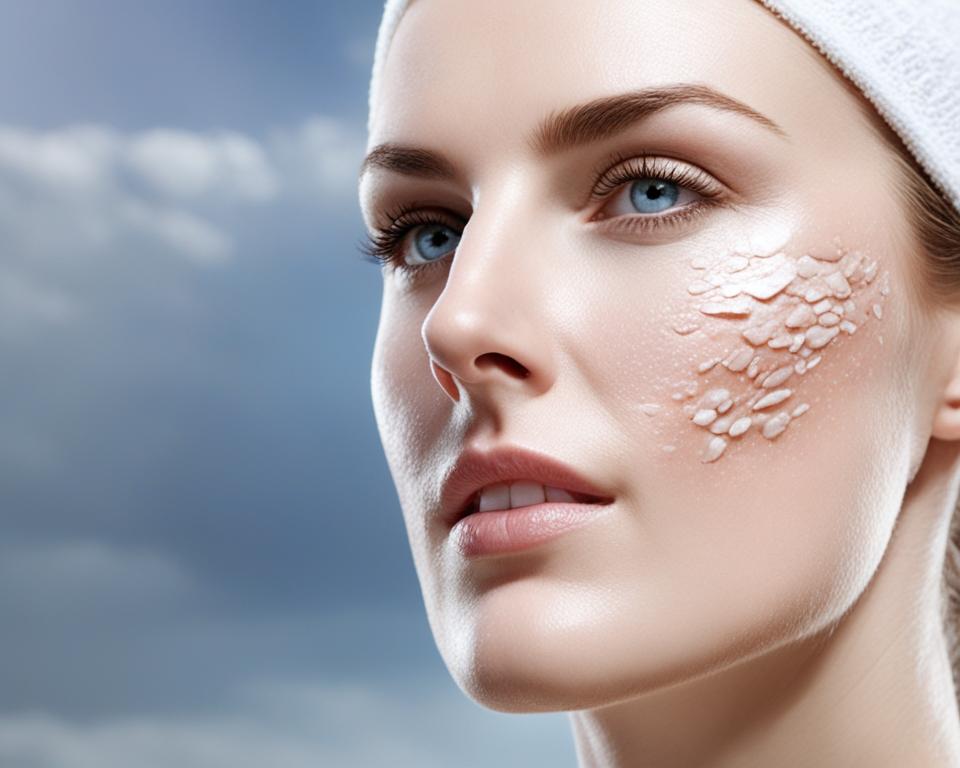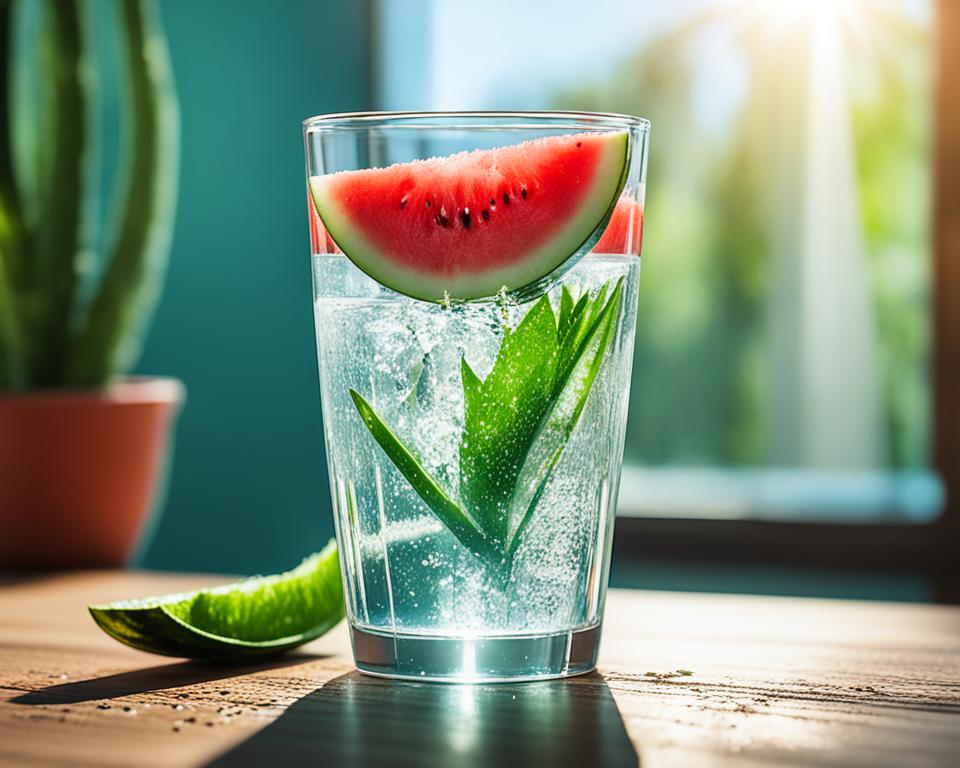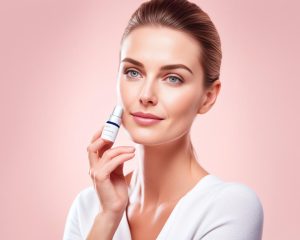
Welcome to our informative article on the transformative role of water in improving skin elasticity. In this section, we will explore the benefits of water for the skin and discuss how staying hydrated can lead to a more youthful complexion.
Water is a crucial element for maintaining healthy skin and plays a vital role in supporting overall skin health. Hydration is essential for ensuring that our skin remains supple, elastic, and well-nourished. By keeping our skin hydrated, we can promote a smoother, firmer, and more youthful appearance.
During the day, our skin constantly loses moisture through various environmental factors, such as exposure to the sun, wind, and pollution. This water loss can lead to dryness, dullness, and decreased elasticity. However, by replenishing our body’s water levels through regular hydration, we can counteract these effects and promote optimal skin function.
Staying hydrated not only helps to maintain the skin’s natural moisture barrier but also supports the production of collagen and elastin, two essential proteins responsible for maintaining skin elasticity. Collagen provides structural support, while elastin allows the skin to stretch and bounce back to its original shape.
By drinking an adequate amount of water each day, we can support the body’s natural collagen and elastin production, thus improving skin elasticity. Additionally, proper hydration helps to flush out toxins from the skin, leading to a clearer complexion and a healthier skin environment.
In the following sections, we will delve deeper into the importance of hydration for skin health and explore how water improves skin elasticity. We will also discuss the effects of dehydration on skin elasticity and provide practical tips for incorporating hydration into your skincare routine. So, let’s dive in and discover how water can help boost your skin’s elasticity and promote a more youthful appearance.
Read more interesting information at ::beauty-hair-news
The Importance of Hydration for Skin Health
Hydration is essential for maintaining healthy skin. The benefits of water for the skin are numerous, and staying properly hydrated is crucial for optimal skin health. Water helps to hydrate the skin from within, ensuring that it functions at its best.
When the skin is well-hydrated, it becomes more resilient and better able to withstand external stressors. Proper hydration helps to maintain the skin’s moisture barrier, preventing moisture loss and promoting a plump and supple complexion.
Furthermore, water plays a vital role in promoting the body’s natural processes, including cell renewal and circulation. Adequate hydration supports the delivery of essential nutrients to the skin, aiding in its repair and rejuvenation.
“Hydration is the foundation of skincare. It’s like giving your skin a refreshing drink of water, keeping it healthy and vibrant.” – Dr. Emma Patterson
The importance of hydration for skin health cannot be emphasized enough. Not only does water help to replenish and rejuvenate the skin, but it also helps to flush out toxins and impurities, promoting a clearer complexion.
It’s important to note that staying hydrated doesn’t just mean drinking water. While drinking an adequate amount of water is crucial, incorporating water-rich foods into your diet, such as fruits and vegetables, can also contribute to your overall hydration levels.
By prioritizing hydration and ensuring adequate water intake, you can support your skin’s health and maintain a radiant and youthful appearance.
| Benefits of Water for Skin | Importance of Hydration for Skin Health |
|---|---|
| Hydrates the skin from within | Maintains the skin’s moisture barrier |
| Promotes resilience and elasticity | Aids in cell renewal and circulation |
| Helps flush out toxins and impurities | Contributes to a clearer complexion |
| Supports overall skin health | Maintains a radiant and youthful appearance |
How Water Improves Skin Elasticity
Water plays a crucial role in improving skin elasticity by influencing the production of collagen and elastin, two essential proteins responsible for maintaining the skin’s firmness and smoothness.
The hydration provided by water is vital for supporting the production of collagen, a protein that gives the skin its structure and strength. Collagen fibers form a network that helps maintain the elasticity and resilience of the skin. When the skin is adequately hydrated, collagen synthesis is optimized, resulting in improved skin elasticity.
In addition to collagen, water also influences the production of elastin, a protein responsible for the skin’s ability to stretch and return to its original shape. Elastin fibers provide flexibility and resilience to the skin, allowing it to retain its youthful appearance. Adequate hydration facilitates the production of elastin, helping to improve the skin’s ability to bounce back and maintain its elasticity.
Furthermore, water aids in maintaining the skin’s natural moisture barrier, preventing transepidermal water loss (TEWL). When the skin is dehydrated, it becomes permeable and loses its ability to retain moisture, leading to dryness and decreased elasticity. By staying hydrated, the skin’s moisture barrier remains intact, keeping it plump, supple, and resilient.
“Water is the source of life for our cells, and proper hydration is essential for maintaining skin elasticity and overall skin health.” – Dr. Sarah Johnson, Dermatologist
Hydration and Skin Elasticity: The Key Takeaways
- Water improves skin elasticity by facilitating the production of collagen and elastin.
- Collagen provides the structure and strength of the skin, while elastin ensures its flexibility and ability to bounce back.
- Adequate hydration supports collagen and elastin synthesis, contributing to improved skin elasticity.
- Water helps maintain the skin’s moisture barrier, preventing dryness and preserving its suppleness.
By understanding how water improves skin elasticity, you can make hydration a priority in your skincare routine. Remember to drink enough water throughout the day and use hydrating skincare products to promote optimal skin health and maintain a youthful, elastic complexion.
| Benefits of Water for Skin Elasticity | How Water Improves Skin Elasticity |
|---|---|
| Supports collagen production | Aids in elastin synthesis |
| Maintains the skin’s moisture barrier | Prevents transepidermal water loss (TEWL) |
| Improves skin elasticity and firmness | Enhances the skin’s ability to bounce back |
The Effects of Dehydration on Skin Elasticity
Proper hydration is key to maintaining healthy and elastic skin. Unfortunately, dehydration can have significant negative effects on the skin’s elasticity. When our bodies lack sufficient water, the skin becomes dry and loses its ability to bounce back, resulting in decreased elasticity.
Dehydration causes the skin to lose moisture, leading to a weakened skin barrier. This barrier is responsible for locking in hydration and protecting the skin from external factors. When the skin barrier is compromised, moisture escapes more rapidly, exacerbating the effects of dehydration on skin elasticity.
As the skin becomes dehydrated, it may also appear dull, rough, and lackluster. Fine lines and wrinkles become more pronounced, highlighting the loss of elasticity. Without enough water, the skin’s collagen and elastin fibers, responsible for maintaining structure and elasticity, become less plump and firm.
When the skin is dehydrated, it is more prone to damage from sun exposure, pollution, and other environmental stressors. These factors further contribute to the breakdown of collagen and elastin, accelerating the loss of skin elasticity.
Dehydration-induced skin changes are not confined to the face; they can affect the entire body. Lack of water can result in dry, flaky skin and a general loss of suppleness throughout. Additionally, dehydrated skin may become more sensitive, irritated, and prone to inflammation.
It is important to note that the effects of dehydration on skin elasticity can be exacerbated by other lifestyle factors, such as excessive sun exposure, smoking, and poor nutrition. These factors can further compromise the skin barrier and worsen the appearance of fine lines and wrinkles.
In order to maintain optimal skin elasticity, it is crucial to prioritize hydration. Drinking enough water throughout the day and incorporating hydrating skincare products can help replenish moisture and support the skin’s natural elasticity. By keeping the skin well-hydrated, you can maintain a youthful, firm, and radiant complexion.
| Common Signs of Dehydrated Skin | Effects on Skin Elasticity |
|---|---|
| Dry, rough, and dull skin | Decreased bounce and resilience |
| Fine lines and wrinkles | Loss of plumpness and firmness |
| Sensitivity and inflammation | Compromised skin barrier function |
Water Consumption and Youthful Skin
When it comes to maintaining a youthful complexion, water consumption plays a crucial role. Staying hydrated is not only essential for overall health but also for promoting skin vitality and a radiant appearance. Adequate water intake can help minimize signs of aging and contribute to a more youthful-looking skin.
One of the key benefits of proper water consumption is its ability to moisturize the skin from within. When the body is well-hydrated, it helps to ensure that the skin remains plump, smooth, and supple. This can help reduce the appearance of fine lines and wrinkles, giving the skin a more youthful texture.
In addition to providing hydration, water consumption also helps to flush out toxins that can contribute to skin damage and premature aging. By staying properly hydrated, the skin is better equipped to eliminate impurities, leaving it looking fresh and rejuvenated.
Furthermore, water plays a role in maintaining the skin’s elasticity, which is crucial for a youthful appearance. Dehydration can cause the skin to become dry and lackluster, leading to a loss of elasticity and the development of wrinkles. By ensuring adequate water consumption, you can help preserve the skin’s elasticity and promote a more youthful, toned look.
“Staying adequately hydrated is one of the simplest yet most effective ways to maintain the vitality and youthfulness of your skin.”
It’s important to note that while water consumption is essential, it should be complemented by a well-rounded skincare routine and a healthy lifestyle. A balanced diet, regular exercise, and proper sleep can also contribute to maintaining youthful skin.
To visually emphasize the link between water consumption and youthful skin, you can refer to the following table:
| Water Consumption | Youthful Skin Benefits |
|---|---|
| Ensuring adequate hydration | Moisturizes the skin from within |
| Flushes out toxins | Reduces the appearance of impurities |
| Maintains skin elasticity | Preserves a more youthful, toned look |
By incorporating optimal water intake into your daily routine and paying attention to other lifestyle factors, you can support the health and youthfulness of your skin. Remember, water consumption is a simple yet powerful tool in your skincare arsenal.
The Optimal Water Intake for Skin Elasticity
When it comes to promoting skin elasticity, ensuring an adequate water intake is essential. But how much water is enough? Let’s explore the general recommendations and factors that may influence individual water needs for optimal skin health.
General Recommendations:
- While the “8×8 rule” (8 glasses of 8 ounces each) is a common guideline, water intake requirements can vary depending on various factors such as age, weight, activity level, and climate.
- Health authorities generally suggest aiming for an intake of around half an ounce to an ounce of water for each pound of body weight. For example, a person weighing 150 pounds would aim for a daily intake of 75 to 150 ounces of water.
- Remember that these recommendations include all fluids consumed throughout the day, not just plain water. Soups, juices, and hydrating foods such as fruits and vegetables also contribute to overall hydration.
Factors Influencing Water Needs:
Several factors can influence an individual’s water needs for maintaining optimal skin elasticity. These factors may include:
- Activity level: Engaging in physical exercise or activities that induce sweating increases the body’s water requirements. It’s important to replenish fluids lost through sweat to support skin health.
- Climate: Hot and dry climates may increase water loss through perspiration and evaporation, necessitating additional fluids to maintain proper hydration and skin elasticity.
- Age: Age-related factors such as decreased thirst sensation and reduced kidney function may affect water intake needs. Older adults should be mindful of their hydration status and consult with healthcare professionals if necessary.
- Medical conditions: Certain medical conditions or medications can impact water requirements. Individuals with specific health concerns should seek guidance from their healthcare providers.
Ultimately, it’s important to listen to your body’s signals and adjust your water intake accordingly.
“Maintaining optimal skin elasticity requires mindful hydration. By understanding the general guidelines and considering personal factors, individuals can tailor their water intake to support their skin health.”
Summary:
Achieving and maintaining optimal skin elasticity requires appropriate water intake. While general recommendations provide a starting point, individual needs can vary based on factors such as activity level, climate, age, and medical conditions. Paying attention to these factors and listening to your body will help ensure that you stay adequately hydrated for healthier, more elastic skin.
| Factor | Influence on Water Needs |
|---|---|
| Activity Level | Higher activity levels may increase water requirements due to increased perspiration and fluid loss through sweat. |
| Climate | Hot and dry climates increase water loss and may necessitate higher water intake to maintain hydration. |
| Age | Aging affects thirst sensation and kidney function, requiring older adults to be mindful of their hydration status. |
| Medical Conditions | Specific medical conditions or medications can influence water needs. Consult with healthcare professionals for personalized guidance. |
External Factors Affecting Skin Elasticity
While hydration plays a significant role in maintaining skin elasticity, there are external factors that can have an impact on the health of our skin. Environmental pollutants, sun exposure, and lifestyle choices all play a part in the overall elasticity of our skin.
Environmental pollutants such as air pollutants and toxins can damage the skin’s natural protective barrier and reduce collagen production, leading to a loss of elasticity. Pollution particles can penetrate the skin and cause oxidative stress, resulting in premature aging and decreased skin firmness.
Sun exposure is another external factor that affects skin elasticity. Prolonged sun exposure and UV radiation can break down collagen and elastin fibers in the skin, leading to decreased elasticity and the appearance of wrinkles and sagging. It is essential to protect the skin from harmful UV rays by wearing sunscreen and seeking shade when the sun is at its strongest.
Lifestyle choices such as smoking, excessive alcohol consumption, and poor diet can also impact skin elasticity. Smoking reduces blood flow to the skin, depriving it of essential nutrients and oxygen, leading to premature aging and loss of elasticity. Excessive alcohol intake can dehydrate the skin and impair collagen production. A poor diet lacking in essential nutrients can also contribute to reduced elasticity and overall skin health.
To mitigate the effects of these external factors on the skin, it is crucial to maintain a healthy lifestyle and incorporate adequate hydration. Drinking enough water helps flush out toxins from the body, supports collagen production, and keeps the skin hydrated, promoting elasticity. By protecting the skin from environmental pollutants and harmful UV radiation and making healthy lifestyle choices, we can optimize skin elasticity and maintain a youthful complexion.

Factors Affecting Skin Elasticity
| External Factors | Impact on Skin Elasticity |
|---|---|
| Environmental pollutants | Damage the skin’s protective barrier, reduce collagen production |
| Sun exposure | Break down collagen and elastin fibers, cause wrinkles and sagging |
| Lifestyle choices (smoking, alcohol, diet) | Reduce blood flow, dehydrate the skin, impair collagen production |
Hydration and Skincare Routine
An effective skincare routine goes beyond the use of cleansers and moisturizers. Hydration plays a crucial role in maintaining skin health and enhancing its elasticity. By incorporating hydrating products and practices into your daily skincare routine, you can achieve a more radiant and youthful complexion.
One of the simplest ways to hydrate your skin is by using a moisturizer. Look for a moisturizer that contains hydrating ingredients such as hyaluronic acid, ceramides, or glycerin. These ingredients help to lock in moisture and improve the skin’s hydration levels. Apply your moisturizer in gentle upward strokes to promote better absorption.
In addition to moisturizers, facial mists can provide a refreshing burst of hydration throughout the day. Keep a facial mist in your bag and spritz it on your face whenever your skin feels dry or tight. Facial mists not only provide instant hydration but also help to awaken and rejuvenate your complexion.
Another essential step in a hydrating skincare routine is the use of hydrating masks. These masks are typically formulated with ingredients like aloe vera, cucumber, or honey, which are known for their hydrating properties. Apply a hydrating mask once or twice a week to replenish and revitalize your skin.
“Hydration is a fundamental step in any skincare routine. It helps to maintain the skin’s natural barrier function, improves elasticity, and enhances the overall health of the skin.” – Dr. Emily Thompson
Incorporating hydrating serums can also significantly boost your skincare routine. Serums are lightweight, fast-absorbing formulas that deliver a concentrated dose of hydration to the deeper layers of the skin. Look for serums that contain hyaluronic acid or vitamin C, as these ingredients not only hydrate the skin but also provide additional benefits such as brightening and firming.
Don’t forget to hydrate your skin from the inside out by drinking an adequate amount of water every day. Staying hydrated internally helps to maintain the skin’s moisture levels and promote overall skin health. Aim to drink at least 8 glasses of water per day, or more if you lead an active lifestyle or live in a dry climate.
To optimize the benefits of hydration in your skincare routine, it’s important to choose products that are specifically formulated for your skin type. Whether you have oily, dry, or combination skin, there are hydrating products available that cater to your specific needs. Consult with a dermatologist or skincare professional to determine the best products for your skin.
Remember, hydration is not a one-time fix but an ongoing process. Consistency is key in maintaining hydrated and elastic skin. Incorporate hydrating products and practices into your daily skincare routine, and you’ll be rewarded with a smoother, plumper, and more youthful complexion.
Foods That Hydrate the Skin
In addition to drinking water, incorporating foods that hydrate the skin into your diet can further promote optimal skin health and elasticity. These water-rich fruits and vegetables not only provide essential nutrients but also help keep your skin hydrated from the inside out.
One of the most hydrating fruits is watermelon. With its high water content and refreshing taste, watermelon not only quenches your thirst but also provides vitamins A and C, which are essential for maintaining healthy skin. Another excellent choice is cucumber, which is comprised of approximately 96% water. This crunchy vegetable not only hydrates but also contains silica, a mineral known for its benefits in promoting plump and youthful-looking skin.
Furthermore, incorporating berries into your diet can also help hydrate and nourish your skin. Strawberries, blueberries, and raspberries are not only delicious but are also packed with antioxidants and vitamins that contribute to skin health and hydration.
“Water-rich fruits and vegetables not only provide essential nutrients but also help keep your skin hydrated from the inside out.”
Leafy greens, such as spinach and kale, are another great addition to your diet for skin hydration. These greens are rich in water and antioxidants, which can help combat free radicals and promote a healthy complexion.
In addition to fruits and vegetables, certain nuts and seeds can also contribute to skin hydration. For example, chia seeds, flaxseeds, and almonds are not only rich in hydrating fats but also contain vitamins and minerals that support skin health.
It’s important to note that while incorporating these water-rich foods into your diet can contribute to skin hydration, they should be complemented with an adequate water intake. Drinking enough water throughout the day remains crucial for overall health, including skin health.
By adding these hydrating foods into your daily meals, you can support your skin’s elasticity and maintain a healthy, radiant complexion. Remember, nourishing your skin from within is just as important as external skincare routines.
Lifestyle Habits for Hydrated, Elastic Skin
In addition to maintaining optimal hydration levels, certain lifestyle habits can further enhance skin elasticity and promote a healthy, youthful complexion. Incorporating these habits into your daily routine can work wonders for your skin:
1. Drink Plenty of Water
Hydration plays a crucial role in skin elasticity, and drinking an adequate amount of water is essential for maintaining a well-hydrated complexion. Water helps to flush out toxins, maintain skin’s moisture balance, and improve overall skin health. Make it a habit to drink at least eight glasses of water per day to keep your skin hydrated and supple.
2. Avoid Excessively Hot Showers
While a hot shower can be comforting, it can strip your skin of its natural oils and lead to dryness and decreased elasticity. Instead, opt for warm showers and limit their duration to prevent excessive moisture loss. Additionally, consider using a gentle cleanser that doesn’t strip your skin of its natural moisture barrier.
3. Incorporate Moisture-Locking Practices
After cleansing your skin, it’s crucial to lock in moisture to maintain hydration and promote skin elasticity. Apply a hydrating moisturizer that suits your skin type to seal in moisture and create a protective barrier. Consider using products with ingredients like hyaluronic acid, glycerin, and ceramides that help attract and retain moisture.
Proper hydration, along with these essential lifestyle habits, can significantly contribute to maintaining hydrated and elastic skin. By incorporating these practices into your daily routine, you can improve your skin’s overall health and achieve a brighter, more youthful complexion.

To summarize, prioritizing hydration through drinking plenty of water, avoiding excessively hot showers, and incorporating moisture-locking practices can help support skin elasticity and promote a vibrant, youthful appearance. By adopting these lifestyle habits, you can nurture your skin’s health and maintain its elasticity for years to come.
Hydration and Exercise for Skin Elasticity
When it comes to maintaining skin elasticity, hydration and exercise go hand in hand. Staying hydrated during workouts plays a crucial role in preserving the suppleness and youthful appearance of your skin. Let’s explore the effects of sweat and dehydration on the skin and discover some practical tips to ensure optimal hydration during exercise.
The Impact of Sweat and Dehydration on Skin
During exercise, your body produces sweat to regulate its temperature. This is a natural process that helps cool down your body. However, excessive sweating without proper hydration can lead to dehydration, which can have a negative impact on your skin’s elasticity. When you sweat, your body loses moisture, including the water content that keeps your skin plump and resilient. As a result, your skin may become dry, dull, and less elastic.
Tips for Staying Hydrated During Workouts
To maintain skin elasticity during exercise, it’s essential to prioritize hydration. Here are some tips to help you stay properly hydrated:
- Drink water before, during, and after your workout sessions. Aim to consume at least 8 ounces of water every 20-30 minutes during intense exercise.
- Consider sports drinks that contain electrolytes if you engage in prolonged and intense workouts. These drinks can help replenish the minerals lost through sweat.
- Avoid sugary drinks and caffeinated beverages as they can contribute to dehydration.
- Use a moisturizer with hydrating properties before and after your workouts to keep your skin moisturized and supple.
- Wear breathable and moisture-wicking clothing to prevent excessive sweating and skin irritation.
By following these simple tips, you can maintain optimal hydration levels during exercise and support your skin’s elasticity.
Hydration and Sleep for Skin Elasticity
Sleep plays a crucial role in maintaining skin health and promoting skin elasticity. When we sleep, our body goes into repair mode, allowing our skin to regenerate and rejuvenate. During this time, proper hydration is essential to support these repair processes and optimize skin function.
Inadequate sleep can lead to dehydration, which can negatively impact skin elasticity and overall skin health. When we don’t get enough sleep, our body’s water balance is affected, resulting in decreased moisture levels in the skin. This can lead to dryness, dullness, and the appearance of fine lines and wrinkles.
By ensuring proper hydration before bed, we can support the skin’s natural healing and rejuvenating processes. Here are some tips to promote hydration and optimal skin function during sleep:
- Drink water before bed: Sip on a glass of water before going to sleep to hydrate your body and replenish moisture levels in the skin.
- Use a humidifier: If the air in your bedroom is dry, consider using a humidifier to add moisture to the air and prevent excessive drying of the skin.
- Apply a hydrating serum: Incorporate a hydrating serum into your nighttime skincare routine to boost moisture levels in the skin and support hydration during sleep.
- Choose a moisturizing sleep mask: Opt for a moisturizing sleep mask that contains hydrating ingredients such as hyaluronic acid or aloe vera. This will help lock in moisture and prevent overnight water loss.
“Proper hydration before bed can support the skin’s natural healing and rejuvenating processes.”
By prioritizing hydration and quality sleep, you can enhance skin elasticity and promote a more youthful complexion. Incorporate these tips into your nightly routine to wake up with hydrated, radiant skin.
Water as a Natural Anti-Aging Solution
When it comes to achieving a youthful and radiant complexion, water is one of nature’s best-kept secrets. The benefits of water for skin health are far-reaching, making it a powerful and natural anti-aging solution.
Water consumption plays a crucial role in combatting the signs of aging. Staying hydrated helps to plump up the skin, reducing the appearance of fine lines and wrinkles. When the skin is adequately hydrated, it appears smoother and more supple, giving it a youthful glow. By incorporating water into your daily routine, you can effectively minimize visible signs of aging without the need for invasive procedures or expensive skincare products.
Dry and dehydrated skin is more prone to premature aging. Insufficient water intake can lead to a dull complexion, uneven skin tone, and pronounced wrinkles. By hydrating from within, you can nourish your skin cells and improve their elasticity, helping to maintain a more youthful and vibrant appearance.
Drinking an adequate amount of water can have a significant impact on your skin’s texture and tone. It helps to hydrate the skin and improve its natural elasticity, resulting in a more youthful and healthy-looking complexion. – Dr. Emily Thompson, Dermatologist
Water also promotes overall skin health by aiding in the detoxification process. It helps to flush out toxins and impurities, reducing inflammation and promoting a clearer complexion. By keeping your body hydrated, you are supporting the skin’s natural rejuvenation process and boosting its ability to maintain a youthful appearance.
The Power of Hydrated Skin
Hydrated skin is more resilient and better equipped to protect itself against external aggressors, such as pollutants and UV radiation. Water acts as a natural barrier, helping to prevent damage caused by these environmental factors. By maintaining optimal hydration levels, you are safeguarding your skin and preserving its youthfulness.
Additionally, staying hydrated can improve the efficacy of your skincare products. When your skin is properly hydrated, it can better absorb and utilize the active ingredients in your skincare routine, maximizing their effectiveness.
Incorporating an ample amount of water into your daily routine is a simple and effective way to promote anti-aging benefits for your skin. By prioritizing hydration and ensuring your body receives the necessary hydration it needs, you can enjoy a more youthful, radiant, and healthier complexion.
Conclusion
Water is an essential component for improving skin elasticity. It not only supports the overall health of the skin but also contributes to a more youthful and radiant complexion. By incorporating an adequate amount of water into our daily routine, along with a balanced skincare regimen and healthy lifestyle choices, we can maintain optimal skin elasticity and promote skin health.
Hydration from within plays a key role in enhancing the production of collagen and elastin, two crucial proteins responsible for skin elasticity. On the other hand, dehydration can lead to dryness, decreased elasticity, and the appearance of fine lines and wrinkles.
To maintain a youthful appearance and promote skin health, it is important to make water intake a priority. This can be achieved by drinking an adequate amount of water throughout the day, consuming water-rich foods, and incorporating hydrating products and practices into our skincare routine. By adopting these habits, we can support our skin’s elasticity and achieve a healthy and glowing complexion.







